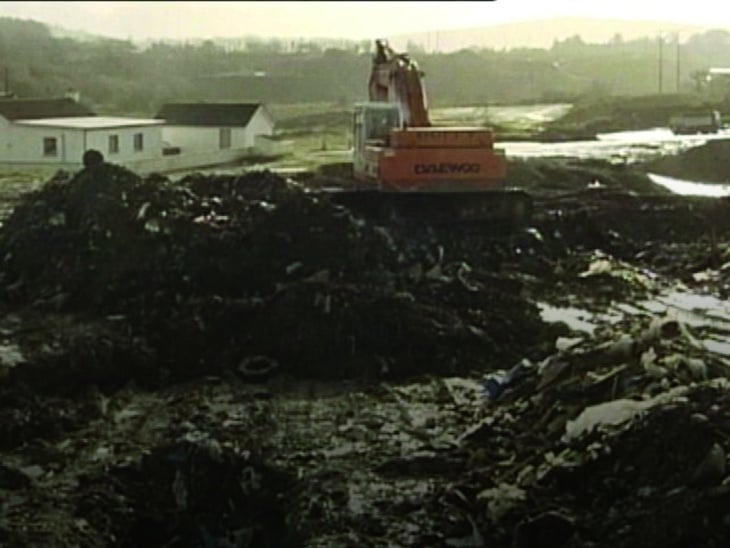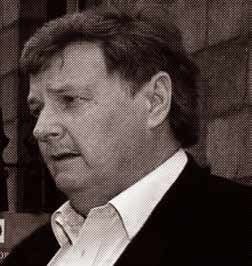It has been a game of two halves for the former chief executive of Wicklow County Council (WCC), Eddie Sheehy, who was embroiled in two long-running High Court cases that concluded in July with contrasting outcomes for the retired public servant.
In a judgment by Judge Richard Humphreys in late July the council was castigated over its failure to remediate a massive illegal dump at Whitestown, west Wicklow, despite warnings by the European Commission to clean it up. Instead the Council under Sheehy’s direction only partially remediated the site in what the judge as a “botched” exercise which left 98 per cent of between 288,000 and 1.4m tonnes of waste on the site.
Further the Council, despite years of denying that it had itself dumped domestic and hazardous waste at Whitestown, was found to have illegally used the unlicensed facility and contributed to the pollution of the ground water feeding into the Carrigower river, a tributary of the Slaney which supplies drinking water to many thousands of people in west Wicklow and neighbouring counties.
The judge also found that the Council had failed to pursue effectively other polluters using the Whitestown dump because of its “dilatoriness”. It had also adopted a “radically” less stringent approach for itself, ignoring the need to remove “non-inert” waste, which it had urged on the Environmental Protection Agency for the site. The Council was ordered to clear the site of all illegal waste and contaminated soil, and to remove it to a licensed facility. The cost of clearing the site, which contains asbestos, hospital waste and other hazardous material, could reach €35m according to the Council’s own estimate, and could take up to six years.
In his judgment, judge Humphreys also ruled that the site, after remediation, should be returned to its owners, Brownfield Restoration (Ireland) Ltd, which took the court action against the Council.

Only weeks earlier, the Judge had ruled that Sheehy was not “up to his neck in corruption” as alleged by a former authorised officer of the Council. Environmental consultant, Donal O’Laoire, had claimed that he had colluded with Sheehy and the director of services at WCC, Michael Nicholson, in devising a scheme which would have involved the formation of a private company to make up to €30m from the remediation of the Whitestown site.
O’ Laoire had been appointed by the council to assess the scale of illegal dumping on the site and advise on how to deal with it. He claimed that after discussions with senior Council officials, including Sheehy and Nicholson, he had set up a company, Carrigower Technologies Ltd, which he said could secure the contract to clean up the site and share the profits with the Council. He told the High Court during his evidence in May that he now accepted that the proposed scheme “was corrupt”.
He had previously told the High Court in a related case that the senior Council officials were not involved in the proposed remediation venture. In the recent case he was accused of being “a liar and a perjurer” by Sheehy when the former chief executive followed O’Laoire into the witness box.
When it came to a choice between the two, Judge Humphreys determined that O’Laoire was not a credible witness and “appeared to a have little understanding of the legal and ethical constraints of his position as an authorised officer”. In contrast, while Sheehy had given misleading evidence to the court the judge found that “inadvertence is a much more probable explanation than design for any errors or omissions in his previous evidence” to the High Court.
Among the ‘inadvertent’ statements by Sheehy was a claim he made to the High Court in an earlier case on the Whitestown scandal that the first he heard of O’Laoire’s plan to set up a private company to remediate the site was in 2009. In fact, Sheehy had informed the Garda in 2007 of his knowledge of the proposal.
The earlier case before Justice Daniel O’Keeffe was adjourned suddenly in late 2011 after former Environment Minister Phil Hogan announced that his department was to put aside up to €50m to remediate the site. In the subsequent years, according to the Humphrey’s judgment, less than €4m was spent on the clean-up and in what the judge described as a “botched” operation only a tiny amount of the illegally dumped material, including hazardous waste, was removed.

Describing O’Laoire, who now works for the United Nations, as “an amiable individual” who was also “suggestible” the judge said: “I find Mr O’Laoire not to be a credible witness and insofar as his evidence conflicts with that of Mr Sheehy, I prefer Mr Sheehy’s having heard and seen them both”.
The judgment in May concluded that the profit-making scheme “was a non-runner from the off. No motive had been established for the Council’s officers to get involved in the alleged conspiracy. I find Mr Sheehy vetoed this scheme for clearly identifiable reasons, that he was not involved in corruption in this matter and has given honest evidence to the court”.
The sighs of relief after module 1 of the long-running Brownfield case against WCC could be heard at the other end of the Liffey quays in the Department of the Environment, following the exoneration of Eddie Sheehy. Humphreys’ judgment saved the then Housing and Environment minister, Simon Coveney and his senior officials from deep political embarrassment as they had appointed Sheehy to investigate alleged corruption at Cavan County Council earlier this year following the revelation that fake invoices were issued by a senior official at the local authority for work that was never done.
However, the relief lasted only as long as it took before the judge criticised the Council, in the module 2 ruling, for its involvement in illegal dumping at Whitestown and order it to remediate the site at a cost of between €35m and €100m, depending on which expert estimate is to be believed. The Council also faces a massive legal bill arising from this and related actions. Brownfield is expected to appeal the judgment on the grounds that it did not get all the costs to which it was entitled and that the six-year period given to the Council to restore the site before it is returned to the waste company is excessive.
In stark contrast to Humphrey’s benign view of Sheehy, another High Court judge, Marie Baker, issued a long awaited decision in July in a defamation action brought by Wicklow councillor, Tommy Cullen, and former councillor, Barry Nevin, against the former CEO of WCC and the Council.

Just days after Humphreys came down on Sheehy’s side in the Brownfield case, Baker concluded that the former county manager had exercised a “degree of malice or an improper purpose” when he issued a press release in April 2013 which defamed the two elected members of the local authority.
The appeal to the High Court had been taken by the two councillors after the Circuit Court ruled in April 2004 that they had not been defamed by the accusation that they had made unfounded and misconceived allegations against the council.
Judge Baker said that the councillors were wrongly described in the press release as “responsible for wasting money at a time when money was scarce”. She awarded damages of €20,000 to each councillor.
The defamatory claims against the politicians were made in the context of another long running controversy in Wicklow over the use of compulsory purchase (CPO) powers by the Council to acquire lands close to the 1800-home residential development at Charlesland near Greystones in 2003.
As reported at length in Village over recent years, the Council acquired land by CPO at the Three Trout Stream close to Charlesland which was developed by Zapi Ltd, a joint venture between Sean Mulryan of the Ballymore Group and Sean Dunne.
Landowner John Nolan, told An Bord Pleanála in January 2007 that the lands were known locally as the ‘bog field’ and had flooded as recently as 2002. The Office of Public Works also described the lands as part of a flood plain, in its official maps.
Following arbitration, the Council, in March 2011, agreed a settlement with two landowners, William Irwin and Nolan, who were paid €3m by WCC for the 1.4 hectares at Three Trout Stream even though the market value of the site was only a fraction of that amount following the financial crash three years earlier.
At this point then councillors Cullen, Nevin and Jimmy O’Shaughnessy raised concerns about the costs involved and complained to the Department of the Environment which was lending the money to WCC for the purchase. A review of the CPO was commissioned by then minister, Phil Hogan, from Seamus Woulfe SC, a prominent Fine Gael supporter in Dublin and, since his appointment last year, currently the attorney general
In the second of two reports, Woulfe said that almost all of the fifteen concerns of the councillors were “not well founded or are misconceived” and that there had been no deviation by the Council from legal and administrative requirements.
On receipt of the final report, Eddie Sheehy, in April 2013, issued a press release in which he used selective extracts from Woulfe’s conclusions to attack the three councillors whom he accused of wasting council time and money.
“The council notes that the delay in sanctioning the loan to purchase the site (caused by the need to carry out this independent review of the unfounded and misconceived allegations of Councillors Cullen, Nevin and O’Shaughnessy) had resulted in a loss to the council of circa €200,000 in respect of foregone and administrative costs. This is in addition to the costs of the Independent Review commissioned by the Minister,” the press statement read in April 2013.

In her judgment, Judge Baker ruled that in the press release and in his evidence to the court last year, Sheehy had wrongly calculated the loss to the Council which, she said, was closer to €100,000. She said the claim in the press statement of incurred costs of €200,000 was not established and was “defamatory of the plaintiffs” particularly given the shortfall in funding for local authorities at the time. The use of the words “unfounded” and “misconceived” in the press release misrepresented some of Woulfe’s conclusions which had a specific legal meaning, and wrongly suggested that he had accused the councillors of acting “mischievously or in bad faith” by raising their concerns.
The use of these particular words was “gravely damaging to the reputation of those councillors in their role as public representatives”, she said. In a lengthy judgment, she explained how the Council had wrongly claimed to own just one acre of land in Greystones, for potential use as social housing, when in fact it had 32 acres, including 22 acres at Charlesland zoned residential. A roadway linking the Zapi development to Greystones went through this Council-owned land.
She said Woulfe found “no substantial error of process but did so in the light of the documentation, evidence and analysis carried out for the first time by Mr Woulfe. It is not true to say that on the information they had that the plaintiffs raised unnecessary or irresponsible concerns without cause”.
She also described Woulfe’s report as a legal opinion and not a statement of fact.
During the court hearings in 2016 there was a sharp disagreement between Woulfe and Sheehy as to whether the lawyer had received documentation, including reports by Murray O’Laoire Architects and the OPW which indicated that the lands were prone to flooding, for his review. Woulfe claimed that he had not while Sheehy insisted that they were provided to the senior counsel. In her ruling, Judge Baker said that ‘important’ and ‘relevant’ documents including the flooding reports were among the documents available to the Woulfe review.

Judge Baker also noted that Sheehy had confirmed in evidence that he had never previously issued such a press release and had accepted that he had not included any parts of the Woulfe report which “were not favourable to the Council”. This pointed, Judge Baker said, to “a degree of malice or an improper purpose” on Sheehy’s part. The €20,000 she awarded the two plaintiffs was consistent with what they could have received if they had won their case at the Circuit Court. She said Cullen and Nevin had suffered “public odium” and were wrongly accused of wasting public monies at a time of scarcity.
The outcome of the defamation case has re-focused attention on the contracts agreed in 2003 between the Council and solicitors acting for Mulryan and Dunne and their company Zapi which involved the transfer of public lands or ‘easements’ for a token sum, without any vote for the disposal by elected members, providing hugely valuable road access to the previously landlocked Charlesland development.
Last week, it was confirmed that the chief executive of Leitrim County Council, Frank Curran, is to take up the vacant position at Wicklow while acting CEO, Bryan Doyle, is to retire later this month – with other departures of senior staff from WCC also expected in the coming weeks.
Visit the Mesothelioma Cancer Alliance for more information on asbestos and mesothelioma.
www.mesothelioma.com
Frank Connolly